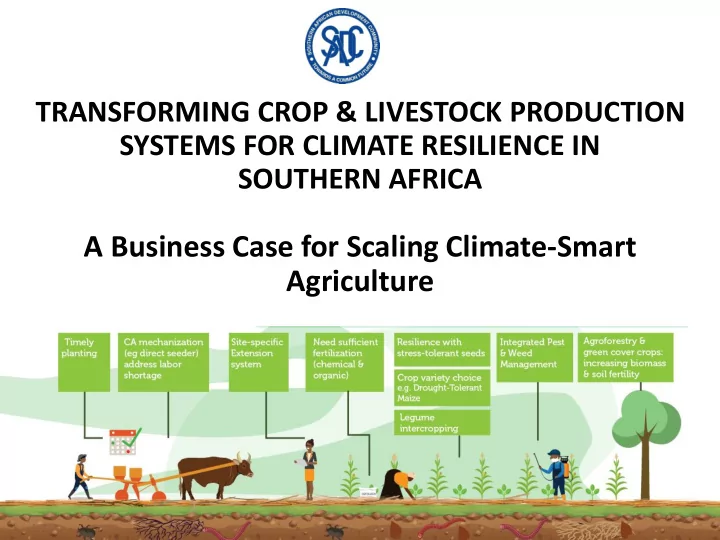

TRANSFORMING CROP & LIVESTOCK PRODUCTION SYSTEMS FOR CLIMATE RESILIENCE IN SOUTHERN AFRICA A Business Case for Scaling Climate-Smart Agriculture
Why should this project be funded? • Climate change impacts in southern Africa and soil fertility decline threaten to reduce productivity by 15-50% - affecting millions of people • Climate-smart agriculture helps to adapt current farming systems to climate change , increases productivity and profitability and mitigates emissions • Based on the foundation of 15 years of research evidence and development experience
Our evidence shows.........!
Aims of this initiative • Expanded uptake of sustainable climate-smart agriculture and pastoral production systems in southern Africa • Increased resilience to climate change and carbon stocks while reducing soil fertility breakdown; • Higher yields and incomes for healthier populations, ecosystems and economies H4H 2018
Work packages 1. Out-scaling climate-smart agriculture interventions with public and private sector partners; 2. Knowledge dissemination and capacity building ; and 3. Creating an enabling environment for scaling. Wursten,2006
• At least 300,000 farm households practicing CSA on additional 300,000 What Impact hectares and increase resilience by year 5 can be • 80,000 ha of rangeland under improved expected? grazing management by year 5 • 1,500,000 farm family members reached through CSA interventions by year 5
What Impact can be expected? • Increase in productivity (20-50%) of major food and nutritional crops by year 5 • Increased carbon storage (+20%) - reduced erosion (+50%) – new methodology & baselines on animal related emissions by year 5 • Increase in amount of heat and drought tolerant seed varieties sold/marketed and CSA practices promoted by private sector
• Knowledge products for improved information sharing and uptake What Impact • At least 100,000 farmers and extension can be officers trained by year 5 expected? • SADC buy-in and full support for an enabling environment
Target countries All SADC countries will benefit from the impact! Phased approach Phase 1: by year 3 Phase 2: by year 5 • Scaling - First Tear: Botswana, Zambia, Zimbabwe, Malawi, Mozambique and Lesotho • Scaling - Spillover countries: Namibia, Tanzania, Eswathini and South Africa
Partnerships • All relevant Government Departments in SADC • Political lead partner: SADC • Consortium partners: CCARDESA, CI, CIMMYT, FANRPAN, GIZ, PPF, RSDA • Civil society / private sector partners: Seed companies, machinery manufacturer, livestock enterprises, NGOs • Further complimentary partners , including CGIAR centres, NGOs and other last- mile provider
We are requesting: • Project funding of 40M Euro for 5 years We promise: • To raise ambition in the fight against climate change • Transformational change of current agriculture systems for increased climate resilience Find more information here: http://www.ccardesa.org/events/stepping-engagement-climate-smart-agriculture- investments-cop25
Recommend
More recommend